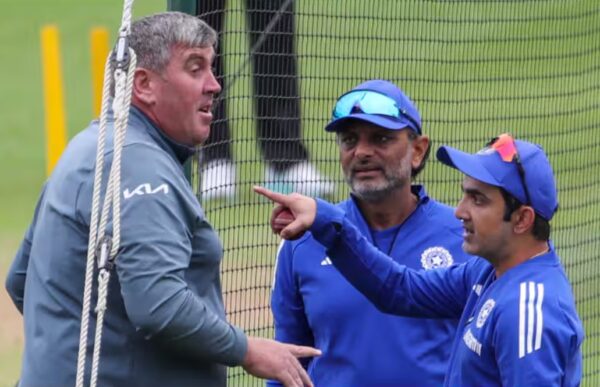India’s lead-up to the much-anticipated fifth Test against England at The Oval was marred by unexpected drama, as the head coach Gautam Gambhir became involved in a fiery confrontation with Lee Fortis, the venue’s chief groundsman.

The disagreement erupted during the team’s training session when Fortis reportedly instructed members of India’s support staff to keep a distance of 2.5 meters from the pitch. The directive was not received well and Gambhir responded angrily, making it clear in a heated exchange that he felt Fortis had overstepped his authority. His reaction, forceful and public, included a direct rebuke questioning the curator’s authority to impose such limitations.
Despite the tension, the team continued with its scheduled training, though the incident clearly cast a shadow over the session. Notably, only ten players participated in the practice, with captain Shubman Gill not present.
Lee Fortis, recognised in county cricket for producing quality multi-day surfaces, also has a reputation of being difficult to deal with and his terse reply to Gambhir’s protest, stating he would report the matter, indicated no intention of backing down.

This confrontation has stirred broader conversation within Indian cricket circles. Former spinner Ravichandran Ashwin, offering his perspective on the issue, suggested that such confrontations could have a galvanising effect on the team. Drawing parallels to past high-pressure moments, including the emotionally charged Sydney Test during a previous tour, Ashwin recalled how moments of tension and external pressure have historically ignited strong performances from India. He noted that even in uncertain or antagonistic conditions, Indian players have often found the resolve to raise their game.
Without delving into the specifics of the current situation or judging whether Gambhir’s response was justified, Ashwin emphasised the psychological edge such incidents can provide. Referring to the recent Day 5 drama in Manchester, he suggested that England might have unintentionally provoked a stronger, more united Indian side. Ashwin warned that pushing the Indian team into a corner can often backfire, as adversity tends to awaken their fighting spirit.

He acknowledged that the outcome of the Test would still depend on performance but noted that emotional sparks like the one seen at The Oval could very well serve as a turning point in the team’s mentality. In his words, the Indian side becomes a “different beast” when under pressure, more dangerous, more driven and more focused.
As the final match of the series approaches, the on-field action now carries an added layer of emotional intensity. What began as a simple pitch inspection has escalated into a symbolic moment of defiance, potentially serving as a rallying cry for a team that thrives when its back is against the wall.




